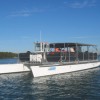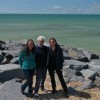National Drought Group

Summer 2022 followed a trend towards hotter drier summers. Record breaking temperatures exceeded 40C for the first time and for many parts of England it was the driest summer on record. Drought conditions remained across most of the country for the latter part of the year, and exceptionally low water resources levels continued to impact the environment, water companies and farmers.
We are more prepared for droughts than ever before, particularly when compared to the well-remembered drought of 1976. Water companies and the Environment Agency continue to implement pre-agreed drought plan measures when necessary, and have taken action to conserve and supplement water. But there is more to do and we must prepare for worst case scenarios such as a dry winter.
The National Drought Group has produced a National Framework for Water Resources that clearly sets out the challenges we may face in the future as our climate changes and our population grows. It sets targets to help meet the deficit and use water resources in the best way. Together with the government and water companies, we are determined to drive forward and intensify that work to meet and beat the targets, as well as working collaboratively with farmers and others to deliver secure, sustainable and affordable supplies of water for us and the environment.
The National Drought Group is made up of senior decision-makers from the Environment Agency, government, the Met Office, water companies and key farming and environmental groups
Follow this link to read more about drought planning by the NDG in 2023
Follow this link to read Defra's policy paper on cleaning up our waters and ensuring a plentiful supply for the future: Plan for Water: our integrated plan for delivering clean and plentiful water
Follow this link to read the Environment Agency document Drought Response: our framework for England 2017
Solar Boat

There are many environmental benefits to be found when using an electrically driven Solar Powered catamaran as opposed to more conventional fuel driven vessels: · Silent running – therefore no disturbance to birds, animals or humans · No exhaust emissions – therefore no CO2 contribution to greenhouse gases · The twin hull configuration contributes two major benefits; tremendous stability and no wash.... Read More»
Letter from David Attenborough

We were so pleased to receive a letter from David Attenborough about the CHASM project. CHASM’s first year report and project document were sent to David Attenborough, who kindly found time to reply. He extended his best wishes the CHASM project and hoped the work would enable protective measures to be based not on hunches, but facts We’ll do our very best!Read More»
Going Dutch

The first Going Dutch workshop (Going Dutch I) led to the formation of the MPP and outlined several ‘blue sky’ options for the future of the area, helping the community to understand the complexities and costs of coastal defence and spatial planning as well as helping local authorities and agencies appreciate the concerns and... Read More»